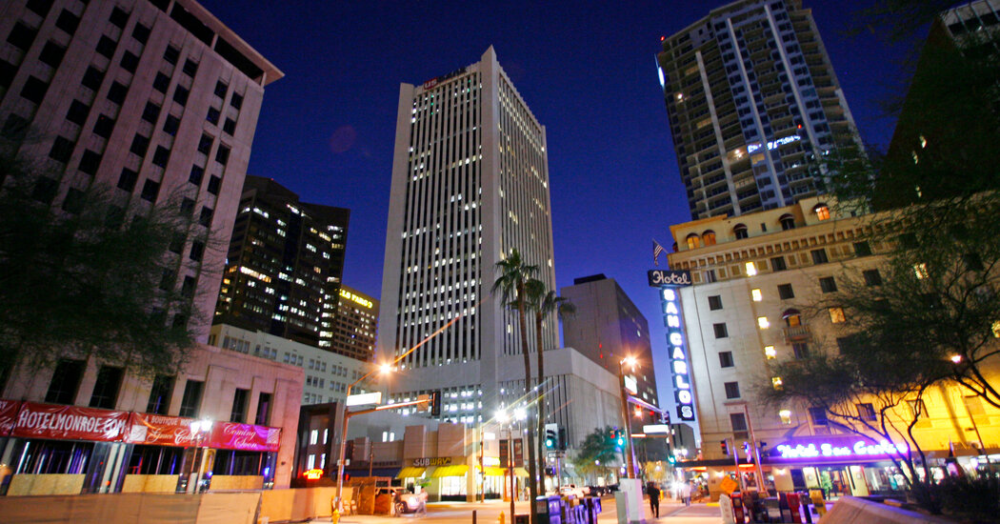Advertisement
Supported by
Homeowners and investors were banking on a big payday, but an oversaturated vacation rental market and nearly full hotels have dampened those prospects.
Send any friend a story
As a subscriber, you have 10 gift articles to give each month. Anyone can read what you share.
Follow our live updates of the Super Bowl between Philadelphia and Kansas City.
Thousands of homeowners in the Phoenix metro area rushed to list their properties on short-term rental sites in the weeks leading up to Super Bowl LVII, anticipating a game-day payoff. Now, just days before kickoff, they’re still clinging to the possibility of last-minute bookings.
Tickets are sold out for Sunday’s big game between the Kansas City Chiefs and the Philadelphia Eagles at State Farm Stadium in Glendale, Ariz., about 20 miles outside of Phoenix, that can hold 73,000 fans. In addition, from Thursday through Sunday, nearby Scottsdale will play host to the Phoenix Open, the best-attended golf tournament in the world with an estimated 700,000 spectators. Spring training, which before the pandemic drew more than 1.7 million visitors each year, follows, although attendance at Cactus League baseball games has been down since the pandemic and last year hovered below 1.2 million.
But despite two of the world’s largest sporting events descending on greater Phoenix on the same weekend, at the height of the season for both snowbirds and sightseers, most short-term rental sites are barely breaking 50 percent occupancy. Frustrated homeowners are being forced to slash prices, and some small investors are beginning to think they made a bad bet.
About two years ago, Karen Ochoa and her husband, who live 400 miles away in Thousand Oaks, Calif., spent $645,000 on a four-bedroom, two-bath investment property in Phoenix and then did a $100,000 renovation, adding a heated pool, firepit and putting green. Ms. Ochoa began renting it out for passive income, and also launched a side business serving as a co-host for other local owners, helping them furnish and design their own rental properties. She listed the house for $1,200 a night during Super Bowl weekend.
There are no takers.
“If you own real estate, you know there’s going to be ups and downs,” she said. “We just didn’t anticipate it with the Super Bowl.”
Ms. Ochoa has even tried to throw in some extras, like a football-themed BBQ for 10 people, to no avail.
“Everybody bought homes in 2021 thinking, ‘Oh, the Super Bowl is coming, I’ll make $10,000 a night,’” Ms. Ochoa, 57, said. “But the fact of the matter is, it’s oversaturated. Everybody who lives in the area is turning their house into a rental.”
They had reason to believe some profit was possible.
When the Super Bowl was in Los Angeles last year, several thousand Airbnb hosts collectively earned about $4 million over the weekend of the big game, said Haven Thorn, a communications manager for the company.
“The spike was not meaningfully different for most properties relative to their rental performance throughout the rest of the year,” said Zach Gorman, co-founder of BHR, a real estate data analytics company.
Los Angeles’s short-term rental market is significantly less competitive than that of Phoenix. A 2019 law made it illegal to rent out any property other than your primary residence in Los Angeles, effectively shutting investors out of the market.
Though Arizona homeowners need to obtain a license to operate a vacation rental, there are fewer restrictions making the market a free-for-all and ripe for investors, big and small.
Investors like Ms. Ochoa snapped up more than 30 percent of Phoenix’s housing stock in the third quarter of 2022. She will still make money during the Super Bowl — she owns a second property, a five-bedroom, three-bath house that she bought for $670,000 and has been able to rent it for $2,500 per night that weekend. One company alone, the Dallas-based Invitation Homes, now owns more than 8,700 homes in Phoenix.
Casago, a vacation rental company headquartered in Scottsdale, has added about 3,000 new listings in just the last two months, said Ryan Dame, Casago’s co-owner.
Terri Compton blamed the proliferation for what will be an empty guest suite and casita at her house on Super Bowl Sunday.
Ms. Compton, 58, a retired building inspector, began renting her house after her adult children moved out and she remodeled her home. She said she has “made a lot of money,” generally charging $125 a night for the casita and $70 a night for the guest room.
Based on advice from online forums for short-term rental owners, she set prices at four times that for the week of Super Bowl. Now, with a vacancy on a night when she should be booked, Ms. Compton has lowered prices about 30 percent, but is hesitant to go much lower, because she is worried about attracting guests who might be disrespectful or heavy partyers.
“A lot of people are crying the blues about not being booked, and having to drop their rates,” she said.
As of this week, about 51 percent of VRBO properties in Phoenix were booked, at a median rate of $450 per night. The median price for properties that remained vacant was $1,000 a night, according to AirDNA, which provides vacation rental analytics.
There are at least two other factors at play: free tickets and hotels.
Most of the fans filling the stands on Sunday didn’t pay for their tickets themselves, Mr. Dame said, noting that the vast majority of tickets to the Super Bowl are bought by corporations. “They’re for people bringing out clients. And corporate travel is still very strong in the hotel sector.”
STR, a hospitality data analytics company, projects that hotels in Phoenix will be 94 percent occupied over Super Bowl weekend, at an average nightly rate of $445.
Advertisement



